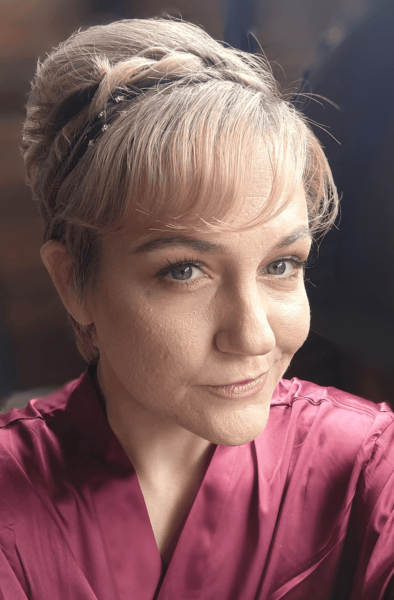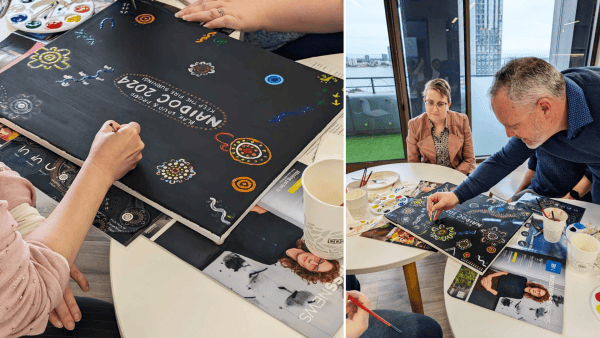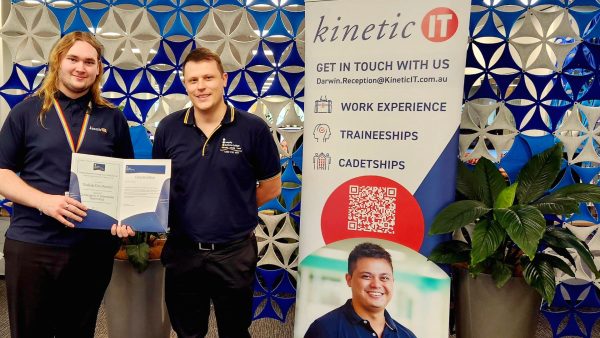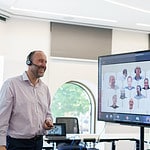To celebrate International Women’s Day, Kinetic IT is celebrating the social, cultural, economic and political contributions of women both within the ICT industry and beyond.
This is the Sure to Rise podcast, providing a platform for a range of voices from Kinetic IT. The podcast will focus on this year’s International Women’s Day theme, Embrace Equity. Each episode aims to provide tangible insights and actions for women and allies to leverage and continue to build upon the great work done so far in the equity and diversity space.
Watch the full episode or access the transcript below.
Episode 1: Kathryn Logan
Transcript – Episode 1 with Kathryn Logan
Nyikina woman Kathryn Logan shares her insights as a First Nations mother and how her personal experiences have shaped her approach to equity. This transcript has been edited for clarity.
Jess Etheridge (host): Hello and welcome to the Sure to Rise Podcast. Before we kick off, we’d like to acknowledge the Traditional Custodians of the lands on which myself and Kathryn are on today, the Whadjuk People of the Noongar Nation, and pay our respects to Elders, past, present and emerging and acknowledge Aboriginal women and girls for their amazing contributions to our world. Hey, Kathryn! How are you?
Kathryn Logan (guest): Good. And yourself?
Jess: I’m good, thanks. Tell us a bit about yourself.
Kathryn: Okay. So I am a proud First Nations woman currently living in Whadjuk land for the last 15 years previously. Prior to that, I lived in Nyikina Land – that’s where I’m from – so being a First Nations mother, I’ve been striving to work with my children to bring them back to Country and just sharing our culture with them. Despite being so far away from our homeland.
Jess: And tell us a bit about your role at Kinetic IT.
Kathryn: I’m the Contract Administrator, I deal with the insurance side of things. I enter the contracts, I’m the point of contact for any supplier insurance queries, any supplier references on the account side. Lots of points of contact in the Commercial Assurance team.
Jess: Back to what you beautifully shared at the start about making sure your kids have connection to Country, what does that look like in practice to you?
Kathryn: For example, connecting to Country for us is we go out and we enjoy our local nature, We do a lot of Aboriginal type artwork with that, like my children tend to do like sand art, barks and stuff like that. My daughter wants to use fabric, but those are mine. And in regards to bringing them back to culture, we actually have them enrolled at a small school, which is classed as an Indigenous school. So it’s, you know, being a smaller school, they get specialised attention and more Aboriginal led activities. Their school song, for example, is an Aboriginal as opposed to like for assemblies as opposed to the national anthem, they will sing that as well as the national anthem.
RELATED CONTENT: Sure to Rise / Episode 2: Capability versus availability
Jess: That’s fabulous. Yeah. What does that mean to you, because you mentioned you are far from Country and your mob – what does it mean to you to know that they’re connecting from such a young age?
Kathryn: It’s great because we have a mob here rather than, you know, we are far from our mob. So we do have our family up there that we connect with regularly over the phone, but it’s different to having our school mob, they’re our family down in Perth. My kids have aunties at the school and cousins at the school that we have no blood relation to but they’ve accepted us as part of their mob because they know that we’re First Nations and that we’re far from home and they they want to involve us.
Jess: Yeah, that’s wonderful. I think everyone needs, you know, that community connection, it’s so important particularly in these times that we live in.
Kathryn: It’s great
Jess: I saw someone say [online] they’re sick of hearing the word unprecedented It’s just ‘precedented’ now! There’s so much going on.
Kathryn: Right? Everything is a precedent.
Jess: Absolutely. And for International Women’s Day, the global organization that is IWD, has determined that this year’s theme is embrace equity. What does that mean to you?
Kathryn: It means changing my mindset and the mindset of people around me to allow each and every single person to achieve their full potential being who they are, not who society considers them to be. Pushing myself and others in my space around me to go beyond what’s expected of us by giving each and all of us the tools necessary to actually achieve those goals. Like, there’s not a standard set of tools for everybody, and we need to be aware of that and make sure everyone has access to the tools necessary to complete their job.
Jess: Mm hmm. And I love that because in that you mentioned “beyond what’s expected of us”. Do you mind elaborating on that and talking about, you know, perhaps some of the things that people might not understand because equity is about- we talk about people getting a ‘fair go’, but in terms of equity versus equality, equity is about giving people, as you said, the tools they need to achieve their full potential. And sometimes under equality, that’s not possible. So what do you think about that?
Kathryn: Perfect example is being in regards to my children. They are being given the appropriate tools by their school. We’re working really closely together to give them the appropriate tools to achieve the goals that they are setting with the school and with themselves and with me in order to get a good education, knock off those emotional regulation points at school, and the school is working with us to give the children better tools, not just the standard tools that the other kids in their class have. We have plans in place to allow them to go out of the classroom and regulate themselves, to go and do a coloring in instead. It’s a separate to other than what everybody else has as part of their standard kit of tools. And it’s just an acceptance of that separate tool and including it in your daily process.
RELATED CONTENT: Sure to Rise / Episode 3: Being an intersectional ally
Jess: Can you tell us about a time or a time you may have experienced or witnessed inequity?
Kathryn: Yes, I personally experienced inequity during previous employment, which opened my eyes to the fact that there are still companies out there that are trying to achieve these equity-inequality goals. So in my case study, both employees, a male and a female, were contracted for the same six month period to do the same job, same hours, same role. And during the course of their employment, those two resources had a discussion and discovered that the male counterpart, despite being several years younger with far less experience, was being given $10,000 a year per annum extra and had [been] issued electronic devices, whereas the female did not have electronic devices issued and was using her personal devices to complete company work. So the disparity was taken to management as both employees felt, you know, they should be doing equal work, equal wages, equal tools. However, they were informed that that was the given rate and the current situation. The end result that I saw from that was that the female employee left the company as she felt there was going to be no upward mobility for her in that situation, and shortly after the male employee also left because, being younger, I believe he felt that it was not an ethical fit for him.
Jess: Thank you for sharing that. How did that make you feel?
Kathryn: It made me really aware that the younger workforce are becoming more aware of these issues and really working to engage only with companies that are meeting those goals and willing to engage with their employees and make sure that they are keeping, you know, quality employees and engaging with them in a great manner rather than just giving you a standard set of tools and saying ‘just work with it’.
Jess: A really good insight, I think, and I’m sure that people listening or watching have experienced very similar experiences. What do you think that kind of experience, or generally witnessing or experiencing inequities, what impact has that had on you as a as a person.
Kathryn: For me, that’s just taught me to ask myself the tough questions. Is this somewhere I want to work? Is this somewhere I see equality being presented? Is everyone being given the right tools to succeed in their job, or are they just being given a standard set of information and expected to make do with it? People… companies that are moving away from this mindset of ‘here’s your standard set of information, let’s just go with it, make it work’ are engaging more people, more resources, their resources are happier, they’re more productive. They want to work there, they want to stay there, they want to build the company together to make it better.
Jess: In your professional view, and you shared a bit about what you work on, what does equity look like or mean to you?
Kathryn: Asking team members, if I’m working in a team environment like it, is there anything else I can supply to make this easier for you? Is there a way that we can approach this together that makes you comfortable? How can we work it to get a resolution? Telling people not to be afraid to ask for assistance, don’t be hesitant to speak your mind about what your requirements are to get your job done, i.e. time management, expectations from external shareholders. Those sort of things. Just be aware of… Communication is key. Just communicate to your team, communicate with everyone. Ask if they need help, the best way to go forward and personally it has worked well for me.
Jess: That’s awesome to hear and it probably leads to the last question to help wrap up this first episode – what’s your advice to people on how they can embrace equity in line with this year’s theme?
Kathryn: Again, just ask everyone: What can I do to help make this easier for you? What do you need from me to get the job done? That’s the best advice I can give.
Jess: Short and sweet, and I think that’s very actionable and helpful. Thank you so much, Kathryn, for your time and happy International Woman’s Day to you and yours.
Kathryn: To you, too.
Visit the Kinetic IT website for future episodes.
About Kathryn Logan
Kathryn Logan is a Nyikina woman and mum of two, originally from the Kimberley region now living on Whadjuk Country in Perth. She’s been with Kinetic IT since April 2022 working in the Commercial Assurance team.














